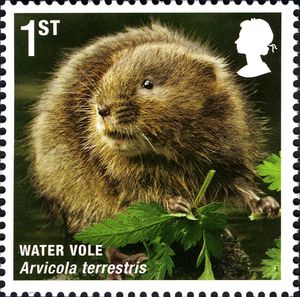English waterways could lose one of their most charismatic and once widespread residents as water voles succumb to the invasive American mink, records released by the Canal and River Trust show.
Between 1970 and 1999, water voles were found on 269 of the 2,000 miles of waterways managed by the trust. But since the turn of the century, their range dropped by almost 50% to 141 miles. Mark Robinson, national ecologist for the Canal and River Trust, said the numbers told of a species in desperate decline. “I very rarely hear good news about water voles. Whether extinction [from England] will occur or whether we will turn the tide I don’t know, but I think it’s certainly in the balance,” he said. The introduction of the American mink, which have escaped from fur farms in Britain since the 1920s, has been the single greatest driver of decline. Mink are voracious predators and will hunt voles. “That has driven whole river systems to a complete population crash,” said Darren Tansley, a wildlife officer with Essex Wildlife Trust. “The possibility [that they will become extinct in England] is there if nothing is done to control mink.”
The development of river banks and water pollution has added to the pressure on one of Britain’s most endangered mammals. The industrialisation of river systems during the 1970s and 1980s destroyed the banks where voles make their burrows. Tansley said although the Canal and River Trust’s numbers were based on ad hoc observations not scientific surveys, they were consistent with the observed decline in all English waterways. Water vole (Arvicola terrestris) populations are very difficult to estimate, but Tansley said the natural population of tens of millions had now almost certainly dropped below one million.
All counties have suffered “dramatic declines”. A survey in Essex in 2006 found most main rivers “utterly devoid of water voles”. The animal is now extinct in Cornwall. Across the country water voles cling on in isolated pockets, coastal marshes and backwaters where the mink has not found its way. In Scotland water voles have fared better by behaving differently to their English cousins, often living on land and thus avoiding the mink invaders.
Source: The Guardian, 11 May 2015
https://www.theguardian.com/environment/2015/may/11/englands-water-vole…

- Login om te reageren
